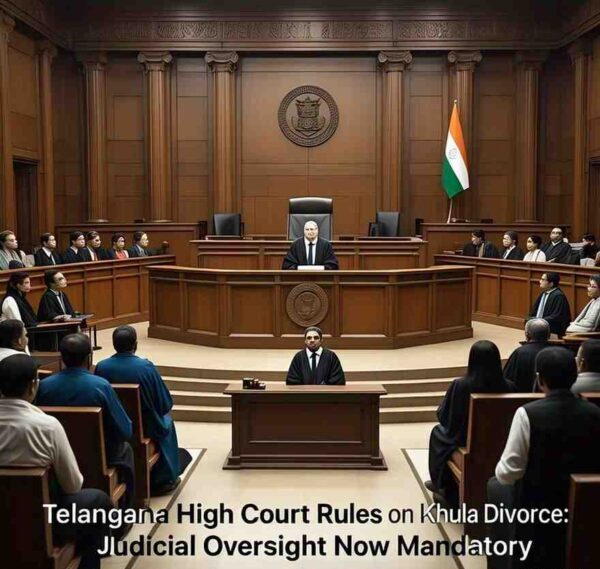Telangana High Court says Khula divorce must go through courts, ensuring legal protection for Muslim women in India.
Introduction
In a significant legal development, the Telangana High Court recently ruled that Khula—a form of divorce initiated by Muslim women—is valid under Islamic law, but must be processed through judicial channels rather than private religious authorities such as muftis or local Sharia councils. This judgment has triggered widespread discussion across legal, social, and religious communities, as it touches upon both personal freedom and the rule of law.
The court’s intervention highlights the growing need to align religious practices with the constitutional and judicial framework of India, ensuring that individual rights, especially those of women, are not undermined by unregulated interpretations or informal systems.
Understanding Khula in Islamic Law
In Islamic jurisprudence, Khula refers to a woman’s right to seek divorce from her husband by returning her mahr (dower) or providing compensation. Unlike Talaq, which is a husband’s unilateral right to divorce, Khula requires the husband’s consent and traditionally involves negotiation. However, various schools of Islamic thought differ on the process and its enforceability.
In many Islamic countries, Khula proceedings are administered by family courts or religious tribunals that operate within a formal legal structure. In India, however, the system has often allowed religious bodies like Darul Qazas or local clerics to issue Khula certificates, raising concerns over legal enforceability and procedural fairness.
The Telangana High Court’s Ruling
In its landmark decision, the Telangana High Court emphasized that while the right to Khula remains protected under personal law, its implementation must occur through courts of law. The court declared that Khula divorces issued by religious figures or private Sharia councils have no legal sanctity unless sanctioned by a competent civil court.
The bench stated:
“A divorce decree that materially alters the marital status of individuals must be passed by a judicial authority… A Mufti or a private religious body does not have the jurisdiction to formally dissolve a marriage under Indian law.”
This ruling arose in a case where a woman had approached the court claiming she had been divorced through a Khula issued by a local religious institution. The High Court scrutinized whether this process fulfilled legal requirements and upheld principles of natural justice.
Why Judicial Oversight Is Necessary
The judgment underlines several key reasons why court involvement in Khula divorces is essential:
1. Legal Certainty
Religious certificates of divorce do not have the same standing in Indian civil law. Without a court decree, such divorces may not be recognized by government institutions, making it difficult for women to remarry, claim maintenance, or assert custody rights.
2. Protection Against Misuse
Without oversight, there’s a risk that religious clerics may issue Khula unilaterally or without ensuring the woman’s informed consent. A judicial process includes safeguards like counseling, time for reflection, and formal records, which help protect both parties.
3. Enforceability
A court decree is enforceable across India. If a husband refuses to accept the Khula, only a court can pass binding orders relating to maintenance, child custody, or property distribution.
4. Gender Justice
Women often face social and financial barriers in securing fair treatment through informal religious channels. Judicial scrutiny ensures that their grievances are heard in an impartial forum and that their rights are protected under the Constitution.
Intersection with the Indian Legal Framework
India’s legal system recognizes personal laws for different religious communities. However, these laws are still subject to constitutional principles such as equality, dignity, and due process. Article 14 (right to equality) and Article 21 (right to life and personal liberty) ensure that religious practices do not override basic human rights.
The Telangana High Court’s ruling draws strength from this constitutional balance, acknowledging religious freedom while asserting the state’s responsibility to regulate and administer justice.
This decision also echoes the Supreme Court’s past observations that informal religious courts do not possess legal authority and that all marriages and divorces must comply with the rule of law.
Public and Legal Reactions
The ruling has been welcomed by many legal experts and women’s rights organizations. They see it as a progressive step towards harmonizing personal law with legal accountability. By requiring that divorces be granted by a civil court, the system can better support women’s access to justice.
However, some voices from within the religious community have expressed concerns about the state interfering with religious practices. They argue that Khula has traditionally been a private matter and should not be brought under judicial scrutiny.
Still, the court clarified that it was not questioning the validity of Khula itself, but rather insisting that any change in marital status must follow a due legal process. It also encouraged religious authorities to guide women toward courts rather than issue their binding pronouncements.
Comparative Perspective: What Other Countries Do
Interestingly, many Muslim-majority countries have already adopted court-supervised systems for Khula:
- Pakistan requires women to file for Khula in a family court.
- Egypt and Tunisia have codified personal status laws that regulate Khula with judicial approval.
- Indonesia and Malaysia: Rely on religious courts integrated into the national judiciary.
India, with its secular constitution, is moving toward a similar approach by emphasizing that no personal law can operate entirely outside the framework of civil law.
Conclusion
The Telangana High Court’s ruling on Khula marks an important juncture in the development of family law in India. It reinforces the need to protect women’s rights and uphold the integrity of legal processes in matters as sensitive as marriage and divorce.
By affirming that only civil courts can legally dissolve a marriage—regardless of religious tradition—the court has set a precedent that could impact similar cases across India. It is a decisive step in ensuring that justice is not just a religious ideal but a constitutional guarantee.
Ultimately, the judgment serves as a reminder that faith and law can coexist, but justice must remain rooted in fairness, transparency, and legal accountability.

























